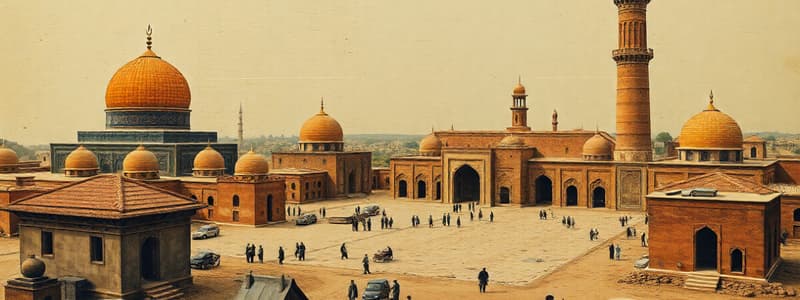Podcast
Questions and Answers
What is the primary focus of a democratic and liberatory learning environment in education?
What is the primary focus of a democratic and liberatory learning environment in education?
- Fostering competitive learning among students.
- Encouraging critical thinking and freedom of expression. (correct)
- Prioritizing standardized testing and assessments.
- Emphasizing rote memorization of facts.
Which aspect best describes the transformative learning process in education?
Which aspect best describes the transformative learning process in education?
- Emphasizing continuous self-evaluation and knowledge development. (correct)
- Maintaining a fixed curriculum with minimal changes.
- Focusing solely on student performance metrics.
- Encouraging memorization of historical events.
How does inquiry-based learning differ from traditional educational approaches?
How does inquiry-based learning differ from traditional educational approaches?
- It promotes active engagement and problem-solving. (correct)
- It places less importance on real-world applications.
- It does not allow for student input in the curriculum.
- It relies heavily on lecture-based teaching.
What is a crucial role of the teacher in a contextual and flexible learning environment?
What is a crucial role of the teacher in a contextual and flexible learning environment?
Which principle applies to holistic learning in the classroom?
Which principle applies to holistic learning in the classroom?
Which statement best describes the general characteristic of postmodern thought in relation to modernism?
Which statement best describes the general characteristic of postmodern thought in relation to modernism?
What aspect of postmodernism does the influence of Nietzsche primarily emphasize?
What aspect of postmodernism does the influence of Nietzsche primarily emphasize?
Which figure is credited with introducing the term postmodernism into the discourse of late 20th-century Western thought?
Which figure is credited with introducing the term postmodernism into the discourse of late 20th-century Western thought?
Which of the following ideas is most closely associated with the postmodernist critique of Western culture?
Which of the following ideas is most closely associated with the postmodernist critique of Western culture?
In what ways does postmodern thought diverge from modernist principles?
In what ways does postmodern thought diverge from modernist principles?
What is a key difference between modernist and postmodernist thought regarding knowledge?
What is a key difference between modernist and postmodernist thought regarding knowledge?
Which statement best reflects postmodernists' view on educational institutions?
Which statement best reflects postmodernists' view on educational institutions?
How do postmodern educators perceive the traditional role of teachers?
How do postmodern educators perceive the traditional role of teachers?
What implication does postmodern thought suggest for curriculum design?
What implication does postmodern thought suggest for curriculum design?
Which of the following areas do postmodernists critique in relation to education?
Which of the following areas do postmodernists critique in relation to education?
What is a defining characteristic of rationalization in postmodern thought?
What is a defining characteristic of rationalization in postmodern thought?
Which of the following best describes the postmodern view on the certainty of knowledge?
Which of the following best describes the postmodern view on the certainty of knowledge?
In the context of postmodernism, what does the term 'massive knowledge production' primarily refer to?
In the context of postmodernism, what does the term 'massive knowledge production' primarily refer to?
What is one of the primary emotional needs identified in postmodernity?
What is one of the primary emotional needs identified in postmodernity?
Which factor is NOT cited as contributing to the rise of postmodernism?
Which factor is NOT cited as contributing to the rise of postmodernism?
How does postmodernism define the role of subjectivity and agency?
How does postmodernism define the role of subjectivity and agency?
What does the synthesis and complexity characteristic of postmodern thought seek to achieve?
What does the synthesis and complexity characteristic of postmodern thought seek to achieve?
Which work is debated as a potential beginning of Postmodernism?
Which work is debated as a potential beginning of Postmodernism?
Flashcards
Postmodernism Origins
Postmodernism Origins
The precise start of Postmodernism is debated, with potential dates ranging from 1966 to the 1970s.
Postmodern Rationalization
Postmodern Rationalization
Separating objective knowledge from subjective experience, empowering individuals through reason.
Postmodern Knowledge
Postmodern Knowledge
Proliferation of information via communication technologies, impacting postmodernity.
Postmodern Certainty
Postmodern Certainty
Signup and view all the flashcards
Postmodern Subjectivity
Postmodern Subjectivity
Signup and view all the flashcards
Postmodern Synthesis
Postmodern Synthesis
Signup and view all the flashcards
Postmodern Human Needs
Postmodern Human Needs
Signup and view all the flashcards
Postmodern Contributing Factors
Postmodern Contributing Factors
Signup and view all the flashcards
Postmodern Emotional Needs
Postmodern Emotional Needs
Signup and view all the flashcards
Postmodern Cognitive Needs
Postmodern Cognitive Needs
Signup and view all the flashcards
Postmodernism
Postmodernism
Signup and view all the flashcards
Modernism
Modernism
Signup and view all the flashcards
Nietzsche's influence
Nietzsche's influence
Signup and view all the flashcards
Michel Foucault
Michel Foucault
Signup and view all the flashcards
Postmodernism's scope
Postmodernism's scope
Signup and view all the flashcards
Postmodernism's interpretations
Postmodernism's interpretations
Signup and view all the flashcards
Democratic Learning
Democratic Learning
Signup and view all the flashcards
Transformative Learning
Transformative Learning
Signup and view all the flashcards
Inquiry-Based Learning
Inquiry-Based Learning
Signup and view all the flashcards
Contextual Learning
Contextual Learning
Signup and view all the flashcards
Teacher's Facilitative Role
Teacher's Facilitative Role
Signup and view all the flashcards
Holistic Learning
Holistic Learning
Signup and view all the flashcards
Postmodern Education
Postmodern Education
Signup and view all the flashcards
Flexible Learning
Flexible Learning
Signup and view all the flashcards
Modernist Thought
Modernist Thought
Signup and view all the flashcards
Postmodern Thought
Postmodern Thought
Signup and view all the flashcards
Postmodern Education
Postmodern Education
Signup and view all the flashcards
Modernist Curriculum
Modernist Curriculum
Signup and view all the flashcards
Postmodern Curriculum
Postmodern Curriculum
Signup and view all the flashcards
Postmodern Teacher Role
Postmodern Teacher Role
Signup and view all the flashcards
Bureaucratic Educational System
Bureaucratic Educational System
Signup and view all the flashcards
Flexible Educational System
Flexible Educational System
Signup and view all the flashcards
Study Notes
Islamic Scientific Achievements
- Significant advancements in various scientific fields during the Islamic Golden Age
- Prominent figures like Ibn Sina (Avicenna) and Ibn al-Haytham (Alhazen) made substantial contributions
- Significant development in mathematics, astronomy, medicine, and other fields
- Translation of classical Greek texts into Arabic played a crucial role in preserving and advancing knowledge
- Observatories were established for astronomical observations and calculations
- Significant development in algebra, geometry, and trigonometry
- Medical advancements: development of sophisticated surgical techniques and pharmacological knowledge, including the use of various herbs and treatments, and the advancement of anatomy.
- Remarkable innovations in optics and understanding of vision
- Contributions in fields of chemistry, such as the creation of new chemical compounds and methods.
Scientific Methodology
- Emphasis on observation and experimentation, leading to empirical discoveries
- Development of analytical tools for scientific research and study
- Scholars used observation and reason to understand natural phenomena
- Emphasis on logic and critical thinking
- Systematic documentation of findings
- Application of mathematical techniques in analyzing data and drawing conclusions
- Importance placed on rigorous study and research
Studying That Suits You
Use AI to generate personalized quizzes and flashcards to suit your learning preferences.




